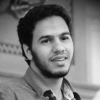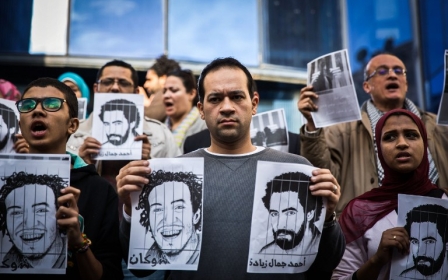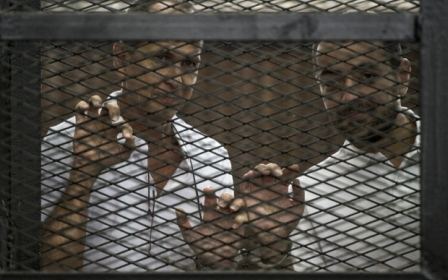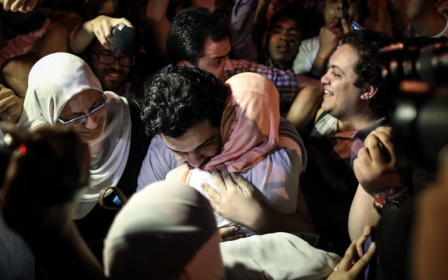'Worse than a criminal': An Egyptian journalist writes from behind bars
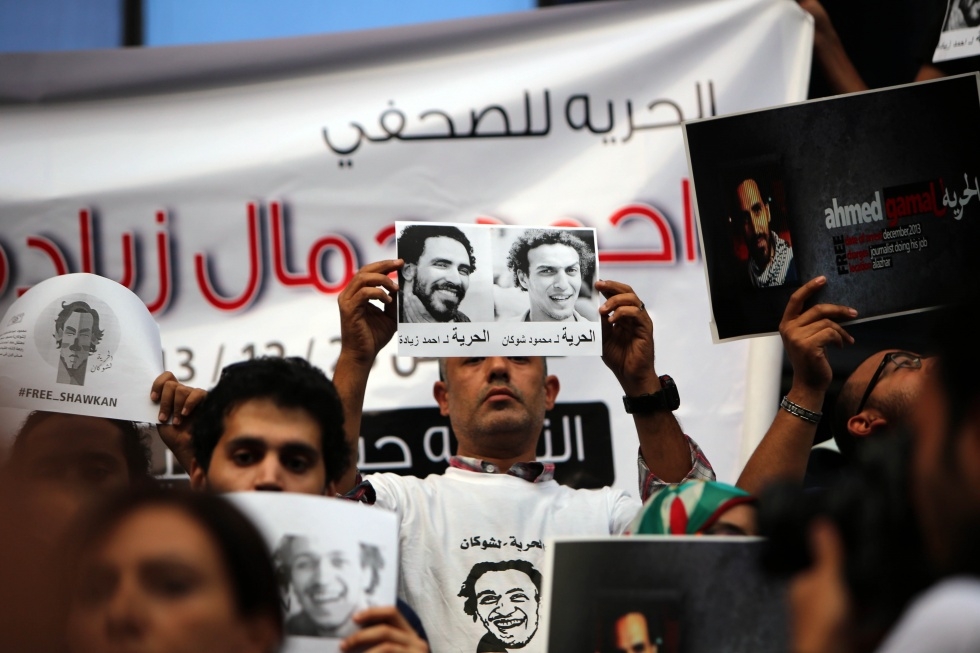
On one of the scorching prison days in the beginning of my detention, while I was walking along the narrow alley that is designated for exercise, on my way back to my cell, a guard called to me, saying: “Come here you criminal”.
That was a heavy word to hear. It was so weird that I thought for a moment that he was calling for someone else. I returned to him and explained that the reason I was in prison was my work in the media, and that I was never involved in any crime whatsoever. He looked at me apprehensively and suspiciously, and said: “That's even worse”.
That incident provoked astonishment within me. This is someone who describes me as a criminal, and then decides that I am even worse than a criminal for simply being a journalist. This is rather strange, indeed. I had just been detained and had not yet realised the extent of the crisis of consciousness and the image people had of those who worked in the press.
For decades, but more intensely during the past two years, this regime has been perfecting the art of violating the freedom of expression and the freedom of the press in particular. It has also legitimised these violations in parallel with its efforts to demonise the profession of the free press, especially when it comes to reporting events outside the control of the authorities, independent from the state’s official news reporting. Such demonisation has had far-reaching repercussions including misleading public opinion and distorting the image a simple citizen has of this profession and those who exercise it.
Many simple-minded people think a journalist is nothing but a spy. Whereas we, the journalists, repeatedly say that we seek to report the truth and convey it to every citizen, in hope of elevating the awareness of the society about what is going on. The authorities seek to convince this citizen - arousing a false sense of patriotism - that we are nothing but spies who endeavour to violate the sanctity of the homeland and expose its points of weakness to its enemies. Regrettably, the outcome is that the public’s perception of the media and of the noble work undertaken by journalists is distorted.
Over a period of 60 years, the authorities innovated with various methods in order to restrain the freedom of thought and the freedom of expression and to break the pens of thinkers, writers and journalists by closing down media outlets and enacting legislation that restrains their activities. Free journalists were engaged in a cat-and-mouse interplay with these authorities in order to secure a greater amount of freedom for the profession. However, lately - especially after 3 July 2014 - repressive measures by the authorities against journalists have reached a maximum level, including the execution of journalists in the field for simply carrying a camera. This happened to my own friends Musaab al-Shami, Habibah Abd al-Aziz and Ahmad Asem.
Scores of other journalists have been detained for months, and some of them were given life sentences, which happened to me. There have been other long-term prison sentences. Such a repressive apparatus aims to deliver a message saying that murder and persecution will be the fate of all those who dare have a voice other than that of the regime; that there is no such thing as freedom of the press, which would be an act of treason and a crime punishable by law; and that the state is not concerned about any international conventions in this regard.
We are in fact living through the worst times for the press in Egypt. We, the detained journalists, are being severely persecuted as a punishment for our decision to practice this profession freely. It is not simply an ordinary detention. We do not enjoy any special treatment to distinguish us from criminals despite the fact that we happen to be prisoners of conscience. Things are even worse than that. From the very moment any journalist is arrested, he or she is completely isolated from the outside world and is severely tortured, at times to extract information and at times for mere punishment. The detained journalist is denied his or her legal right such as talking to a lawyer or demanding an inquiry into the mistreatment and torture to which he or she is subjected, or to see the interrogation records, or learn more about the charges leveled against him or her. This is not where it ends. After a sentence is given, journalists are transferred to maximum-security jails known for their human rights abuses (such as al-Aqrab Prison). This does not happen even to the most dangerous criminals.
According to prison rules, detainees are divided into criminal, political and journalist. In the beginning, I thought my designation as a journalist was going to afford me the best treatment among them, and this was the thinking of many of the detained journalists I came across inside the prison. As soon as they were detained, they were keen to show their press cards. However, the reality was the exact opposite of what we expected, even when it comes to the finest of details. For instance, criminal convicts are permitted to have newspapers and television sets, whereas journalists are denied such things. Criminal convicts are permitted to bring in all sorts of personal devices and various types of food whereas these things are strictly prohibited when it comes to us. The only reason for such treatment is to make life tougher for us. Inspection campaigns are carried out repeatedly in cells hosting journalists. They are carried out in the most inhumane and least respectful manner. On the other side, criminal convicts live comfortably in their cells. On the breaking of the fast on the day of Eid, 424 criminal convicts were pardoned and released. The list of those pardoned and released did not include a single journalist or prisoner of conscience.
Now, after spending two years in jail, and having been given a life sentence, I realise fully that detained journalists, under the present regime, are the most severely persecuted, punished and deprived. They are denied all the basic rights to which a detainee is entitled and are denied a fair trial. This regime is simply treating us as enemies.
- Abdullah Elfakhrani is a journalist, human rights activist and medical doctor in training who was detained in Egypt in August 2013 and has been sentenced to life in prison
The views expressed in this article belong to the author and do not necessarily reflect the editorial policy of Middle East Eye.
Photo: Egyptian journalists and photojournalists take part in a protest in front of their syndicate in Cairo (AFP)
New MEE newsletter: Jerusalem Dispatch
Sign up to get the latest insights and analysis on Israel-Palestine, alongside Turkey Unpacked and other MEE newsletters
Middle East Eye delivers independent and unrivalled coverage and analysis of the Middle East, North Africa and beyond. To learn more about republishing this content and the associated fees, please fill out this form. More about MEE can be found here.


